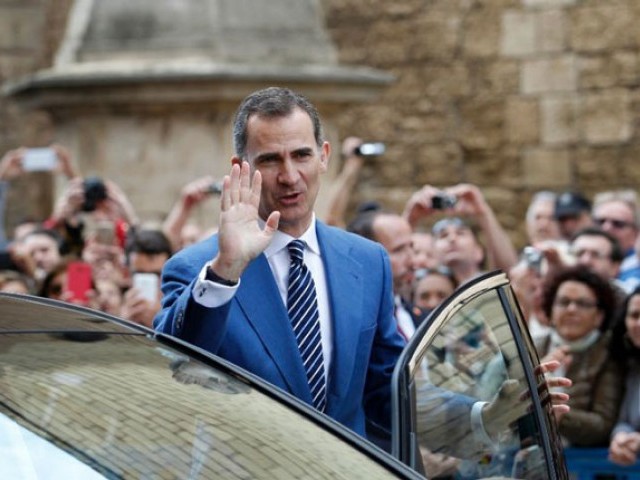
Here is a look back at the early-morning broadcast by King Juan Carlos I in 1981 that staved off an attempted military coup and won him legitimacy in the eyes of an unsure nation.
The fallout from Catalonia's banned referendum vote on Sunday is considered Spain's worst political crisis since then.
Felipe called on the state authorities to defend "constitutional order."
On February 23, 1981 about 200 Civil Guards storm into the lower house of parliament as lawmakers vote in a new prime minister.
Parliamentarians cower under their benches as the guards fire submachine guns into the ceiling and hold the lawmakers hostage.
The push to install a military regime is backed by a few army generals nostalgic for the rule of dictator Francisco Franco, which ended five years earlier.
As confusion reigns, Juan Carlos appears on television around 1am on February 24 in military uniform to reassure the nation and make clear he will not tolerate any threat to the young democracy.
Spain's Felipe in Saudi as warship sale mooted
"In the extraordinary circumstances that we are currently experiencing, I ask of everyone the utmost peace and confidence," he says.
"Given the situation created by the events that took place in the Palace of Congress, and to avoid any possible confusion, I confirm that I have ordered Civil Authorities and the Joint Chiefs of Staff to take all necessary measures to maintain constitutional order, within the law," he said.
"The Crown, the symbol of the permanence and unity of the nation, cannot tolerate, in any form, the actions or behaviour of anyone attempting by force to interrupt the democratic process of the constitution."
The speech calms the country, which had been wary of Juan Carlos after Franco chose him as his successor.
The guards who had stormed the chamber later climb out of the windows to give themselves up and the leaders of the short-lived attempted coup surrender within hours.
Juan Carlos said later he only went on air when he was sure he had the support of various military leaders.
"I knew that the soldiers were going to agree because I had been named by Franco... because I had been through the military academy and I had won the friendship of most of them."
Spain hopes to sell warships to Saudi Arabia
The speech also proved to be the making of the king, then aged 43, five years into his reign.
"The king had been legitimised in the constitution, but his legitimacy from a popular point of view came from that night, when instead of opting for the coup leaders, he opted for the people," recalled Jose Bono, an MP who witnessed the assault on parliament.
Juan Carlos kept his son and heir Felipe, then aged 13, at his side throughout the crisis. He recalled afterwards: "I wanted him to see what one has to do when one is king."










1732354127-0/Untitled-design-(3)1732354127-0-270x192.webp)






COMMENTS (1)
Comments are moderated and generally will be posted if they are on-topic and not abusive.
For more information, please see our Comments FAQ